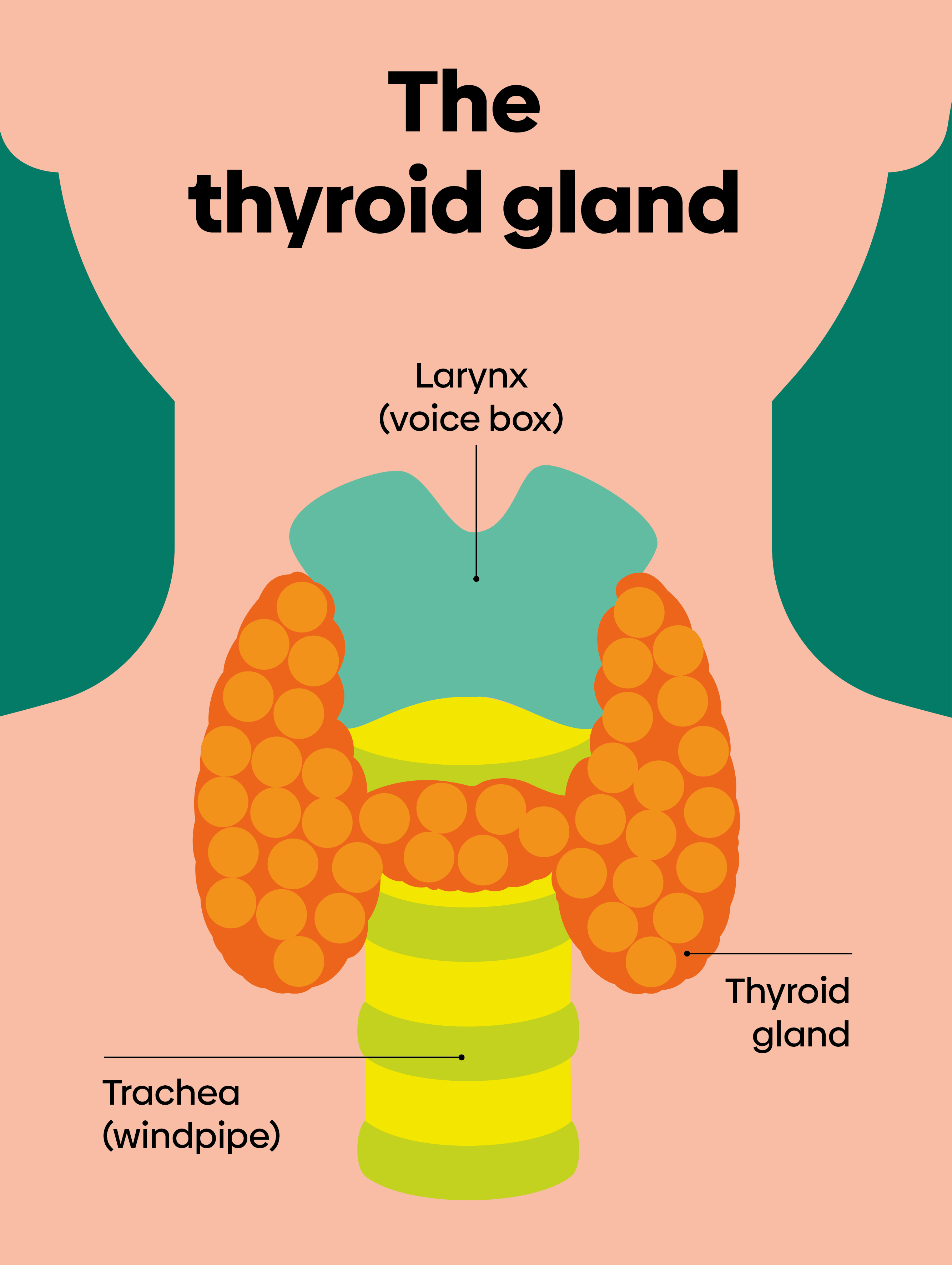Have you noticed that you’ve gone up or down a dress size for no reason, and feel more tired than usual? Maybe your skin is drier than before, or you’re suddenly full of nervous energy that you don’t know what to do with?
These are just a few of the signs that suggest there might be something wrong with your thyroid gland. But they can also be caused by lots of other conditions – which can be frustrating when you’re trying to work out how to make things better.
We don’t want you to stop living life to the full, or have to put up with symptoms that affect your wellbeing. And the good news is that, once you get the right diagnosis, thyroid problems can usually be easily treated. So if you think you might have a thyroid issue, you’re better off getting help sooner rather than later.
That’s why we’ve put together this guide to understanding your thyroid, from how it works and spotting the symptoms of a problem, to ways to deal with them.

What is your thyroid gland and what does it do?
You can’t see your thyroid gland – it sits at the front of your neck, between your collar bone and Adam’s apple. It’s often said to be shaped like a butterfly.
Here’s what you need to know:
- your thyroid gland makes 2 hormones – thyroxine (T4) and triiodothyronine (T3) – which are released into your bloodstream
- these hormones have very important jobs in your body, including controlling your heart rate and ‘metabolism’ – how your body turns the food you eat into energy, which keeps everything working well
- if you have a problem with your thyroid gland, the amount of hormones it makes can change
- it can stop making enough hormones – which will slow down your metabolism and heart rate
- or it might make too many hormones – which will speed up your metabolism and heart rate
What are the different types of thyroid problems?
‘Thyroid disease’ is the general term for a condition where your thyroid gland stops making the right amount of thyroid hormones.
It can become either ‘underactive’ or ‘overactive’:
- underactive thyroid (hypothyroidism) – this is when your thyroid gland doesn’t make enough hormones. It’s often caused by an ‘autoimmune’ condition – when your immune system attacks your thyroid gland by mistake – called Hashimoto’s thyroiditis (see below)
- overactive thyroid (hyperthyroidism) – this is when your thyroid gland makes too many hormones. Less common than an underactive thyroid, it’s often caused by another autoimmune condition, called Graves’ disease. If this runs in your family, you could be at higher risk
Several other thyroid problems can cause an underactive or overactive thyroid – although in some cases, they won’t affect the amount of hormones your thyroid gland makes. These problems include:
Several other thyroid problems can cause an underactive or overactive thyroid – although in some cases, they won’t affect the amount of hormones your thyroid gland makes. These problems include:
- thyroiditis – this is inflammation of your thyroid gland, which often causes high or low levels of thyroid hormones. There are several types of thyroiditis), including Hashimoto’s (see above)
- thyroid nodules – these are lumps that can develop on your thyroid. In many cases they don’t cause any symptoms, and aren’t usually serious – but they should always be checked by a doctor
- goitre – this is a lump in the front of your neck, caused by swelling of your thyroid gland. You can usually feel and see it moving up and down when you swallow. Again, it won’t always cause symptoms, but you should see a doctor about it
- thyroid cancer – it’s rare, but a lump in your thyroid could be cancerous. This type of cancer is usually treatable, and in many cases it can be cured
What are the signs of a thyroid problem?
Because thyroid hormones control your metabolism, thyroid problems can make your metabolism either slow down (underactive thyroid) or speed up (overactive thyroid).
This can cause lots of different symptoms. But key signs include changes to your:
- energy levels – a slow metabolism can leave you feeling tired and sluggish, while a speeded up metabolism can lead to nervous energy and trouble sleeping
- weight – if your metabolism slows down, you might gain weight, while if it speeds up, you can lose weight
- temperature control – you may notice you often feel too cold and sweat less than you used to (slow metabolism), or feel too hot and get more sweaty than usual (fast metabolism). Sweating less can also lead to dry skin – another common symptom of underactive thyroid
Thyroid hormones also help to control your heart rate, and how well it pumps blood around your body. So if you have a thyroid problem, you might notice a:
- slow heart rate (underactive thyroid) – this may make you feel tired and out of breath when you try to exercise
- fast heart rate (overactive thyroid) – you may have palpitations, possibly with feelings of anxiety
If you think you have some of these signs, read more about the symptoms of an underactive or overactive thyroid.
Signs of other thyroid problems – such as nodules or a goitre – include:
- feeling or seeing a swelling or lump in your neck
- throat tightness
- trouble swallowing
Read more about the symptoms of thyroid nodules, goitre or thyroid cancer.
If you think a thyroid problem could be to blame for your symptoms, but you’re not sure if you should see a doctor, try our Smart Symptom Checker to help you work out your best next steps.

Doctor’s tip
“Thyroid symptoms can often be mistaken for other health issues, because abnormal thyroid hormones can play havoc with lots of bodily functions,” says Dr Adiele Hoffman, Healthily Clinical Content Reviewer. “For example, you might have noticed that your periods are unusually heavy or have suddenly become irregular. Your thyroid might not be the first thing you think of, but it’s something to consider testing if you’re having period problems.”
Who gets thyroid problems?
Anyone can develop a problem with their thyroid gland, and it’s quite common. According to the British Thyroid Foundation, it affects about 5% of people in the UK. And in the US, the American Thyroid Association says more than 12% of people will develop a thyroid problem at some point.
You’re more likely to get a thyroid problem if:
- you’re female
- you’re over 60
- you have a family history of thyroid problems
- you’ve been pregnant within the last 6 months
- you’re taking a medicine that’s high in iodine
- you’ve previously had surgery or treatment for a thyroid problem
- you have certain other health conditions – including diabetes, rheumatoid arthritis, coeliac disease, lupus, pernicious anaemia, primary adrenal insufficiency and Sjögren’s syndrome
What causes thyroid problems?
As mentioned above, thyroid problems are often linked, and one issue can lead to another. For example:
- underactive or overactive thyroid – can cause a goitre
- thyroiditis – can cause an underactive or overactive thyroid, or thyroid nodules
- thyroid nodules – can cause an overactive thyroid or a goitre
- thyroid cancer – can cause a nodule, goitre or overactive thyroid (but it’s a rare cause of these problems)
Other causes of thyroid problems include:
- autoimmune conditions – as mentioned above, thyroid problems are often caused by conditions where your immune system attacks your thyroid gland by mistake. Hashimoto’s disease causes thyroiditis and an underactive thyroid, while Graves’ disease causes an overactive thyroid
- thyroid treatment or surgery – treatment on your thyroid gland or neck can cause thyroiditis or an underactive thyroid
- pregnancy – this can sometimes cause an overactive thyroid. You can also get ‘postpartum’ thyroiditis after you’ve given birth
- medication – certain medicines can cause an underactive or overactive thyroid, thyroiditis, or a goitre
- iodine intake – getting too much iodine from foods or medicines can increase your risk of an overactive thyroid, while iodine deficiency can cause an underactive thyroid or a goitre, though this is rare in the UK and US
- infections – both viral infections and, more rarely, bacterial infections can cause thyroiditis
- pituitary gland problems – these can be a rare cause of underactive and overactive thyroid
Think one of these issues might be causing your symptoms? Read more about the causes of an underactive or overactive thyroid, thyroiditis, thyroid nodules or a goitre.
Finally, it’s also worth bearing in mind that there isn’t always a clear reason why a thyroid problem develops.
How to cope with thyroid disease
Dealing with the many symptoms that a thyroid problem can cause can make going about your everyday life challenging. You may feel frustrated, upset, worried or exhausted.
But getting the right diagnosis from your doctor will ensure you can get the medical treatment you need (see below).
Online support groups are also available, and talking to other people who are going through the same thing can really help.
Looking after yourself with a few self-care tips can make a big difference, too – so check out our tips for coping with the symptoms of thyroid problems.
When to see a doctor
If you have symptoms of a thyroid problem, you should speak to your doctor. They can help you find out what’s going on, and what treatment is right for you.
How are thyroid problems diagnosed?
It can sometimes be hard to get a diagnosis right away, because many of the symptoms of thyroid problems can also be symptoms of other conditions.
But your doctor can suggest some tests and scans to help find out what’s causing your symptoms. These may include:
- blood tests – to check the levels of thyroid hormones in your blood
- imaging tests – to take a closer look at your thyroid gland and how it’s working
- biopsy – to check for abnormal cells in your thyroid gland
Here’s all you need to know about thyroid tests and scans.
How are thyroid problems treated?
In many cases, thyroid problems will need medical treatment.The best treatment for you will depend on your thyroid problem and symptoms:
- if you have an underactive or overactive thyroid, you’ll often need to take medicines to bring your levels of thyroid hormones back to normal. Read more about underactive thyroid treatment or overactive thyroid treatment
- in some cases, you may need surgery to remove some or all of your thyroid gland. This might be if other treatments haven’t worked; you have a large goitre or nodule that’s making it difficult to swallow or breathe; or you need treatment for thyroid cancer







